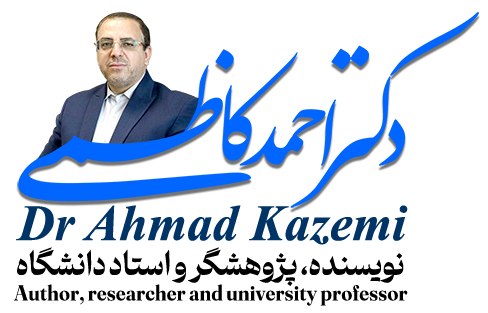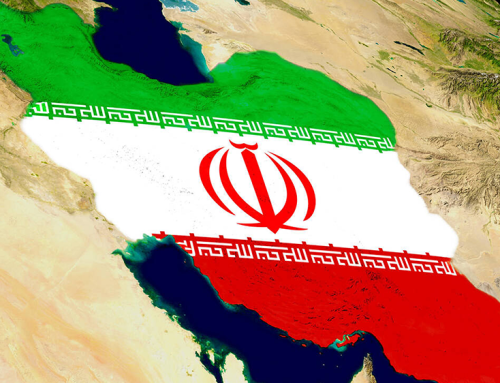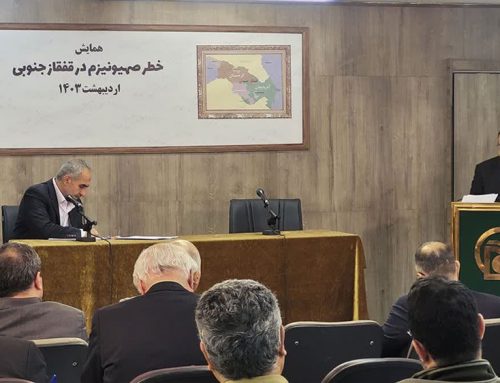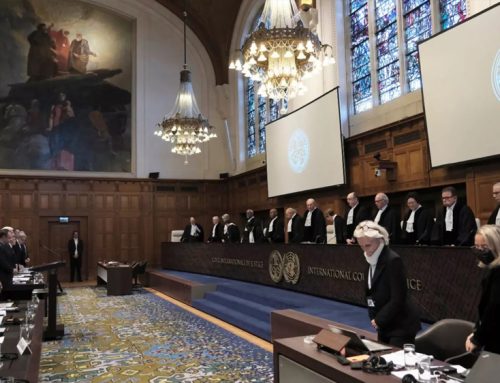Dr. Kazemi emphasized Iran’s readiness to confront any ventures by the Israeli-London front in the Caucasus, asserting that Tehran’s red lines are non-negotiable in opposition to geopolitical changes in the region. During the seminar titled “National Security of Iran and Armenia in the Shadow of Regional and Extra-Regional Threats and Conflicts” at the Armenian Social Association in Tehran, Dr. Ahmad Kazemi delivered a speech titled “Iran’s National Security in the Face of the Crisis in the Caucasus and West Asia vis-à-vis the Axis of Turkey, the Republic of Azerbaijan, the Israeli Regime, and NATO.” He provided insights into the current situation in the Caucasus and outlined future prospects.
At the onset of his speech, the university professor of international law highlighted the martyrdom of 200,000 Iranians during the Caucasus secession battles with Russia. He also underscored the significance of the Caucasus and the Qaf Mountains in Iranian mythological and mystical literature, emphasizing Iran’s principled perspective on the Caucasus, which encompasses historical, cultural, and religious dimensions. Dr. Kazemi pointed out a paradigm shift in the approach of certain Western countries towards territorial conflicts in the Republic of Azerbaijan and Armenia since 2020.
He attributed this change to NATO’s U.S. and UK-centered failed plots in Afghanistan and Iraq and particularly against the resistance front West Asia region and said the main reason behind this paradigm shift is NATO’s grand plan to instigate geopolitical transformations in the Caucasus and Central Asia through leveraging the Karabakh conflict to establish an Anglo-Saxon order, aiming to disrupt the transition to a new order centered on Iran, Russia, and China.
Regarding developments in the Caucasus post the Second Karabakh War (2020), Dr. Kazemi categorized such events as attempts to foment historical anti-Iranian sentiments. He outlined key features of this period as follows:
- • Agents of geopolitical sedition: Turkey, the Republic of Azerbaijan, and the Israeli Zionist regime; masterminds: NATO with the UK in center.
- • Alignment of geopolitical and security strategies at three levels: national, transnational, and international.
- • The pivotal role of the Israeli regime in the region’s developments with the ultimate goal of promoting ethnocentrism and separatism.
- • The deception of Russia by Baku and Ankara using energy resources and Moscow’s continual errors leading to the collapse of Russian influence in the Caucasus.
- • The complementary role of Aliyev and Pashinyan in advancing the Anglo-Saxon agenda, with joint insistence on safeguarding British and Israeli pipelines during the Second and Third Karabakh Wars.
- • Intensified ambivalence among Europeans due to concerns in continental Europe about the implications of Neo-Ottomanism.
- • China’s opposition to the fictitious Zangezur Corridor due to its connection to all NATO plans in the region aimed at countering China’s One Belt – One Road initiative. The President of the United States, Joe Biden, at the June 2022 G7 summit, emphasized the commitment of 200 billion US dollars over a period of 5 years from the total 600 billion budget approved by the G7 to implement the global initiative (Global Gateway) to deal with the Belt and Road. Dr. Kazemi also referred to the recent statements of the Vice President of the European Commission, 1 at the “Global Gateway” investor forum in Brussels regarding the “investment of European banks and institutions in transport infrastructure in Central Asia.” He noted that this position aligns with the European approach to strengthening the Middle Corridor (the route from Central Asia, through the Caspian region, the Republic of Azerbaijan, Georgia, to the Black Sea and Turkey), which has no connection with the fictitious Zangezur Corridor.
- • The dominance of cognitive and informational warfare over field developments since 2020 in the Caucasus.
Dr. Kazemi identified the primary objectives of the Israeli-London axis as implementing the English Pan-Turanian idea to partition southern Armenia and establish NATO’s Turani Corridor and the geographical connection of the so-called Turkish World. He condemned this scheme as seditious, aiming to create Turkish NATO and foster an anti-Iranian, anti-Russian, and anti-Chinese order, in major regional energy and transit equations, thereby altering the region’s geographical landscape through ethnocentrism and separatism.
The university professor of international law proceeded to outline the current situation and the future prospects, highlighting the following key points:
- The breakdown of the 2020 agreement due to the violation of Armenia’s borders, the destruction of the Lachin Corridor, and ethnic cleansing in Karabakh, the legal illegitimacy of Baku and Ankara’s invocation of this agreement’s provisions.
- The occurrence of one of the most systematic ethnic cleansing in the region by Aliyev, with indirect cooperation from Pashinyan, who envisages a halt to Baku and Ankara’s territorial ambitions against Yerevan.
- The failure of the idea of a sovereign 29,800 square km Armenia due to Baku’s continued aggression despite ethnic cleansing in Karabakh.
- Baku’s reluctance to sign the peace agreement, waiting for the Yerevan government to make further concessions.
- The exposure of Baku’s deception of Russia and sidelining Moscow from the negotiation process by proposing the Kaliningrad model to connect the Republic of Azerbaijan to Nakhchivan.
- Baku’s proxy role in imposing Turkey’s conditions on Armenia regarding the 1915 Armenian massacre and historical disputes between Yerevan and Ankara.
- The failure of Pashinyan’s Crossroads of Peace plan due to Baku and Ankara prioritizing security plans over communication lines.
- Convergence of Iran and inward-looking Europe’s views on the Caucasus and Armenia due to European apprehension about neo-Ottomanism.
- Baku’s preparation for new conflict under the pretext of internal conflicts and linking early presidential elections to this issue.
- Baku’s proposal to repatriate over 200 thousand deported Armenians from Baku, Sumgait, Shamakhi, and Ganja, in return for the return of ethnic Azerbaijanis.
The senior Eurasian researcher also delineated the major consequences of the Israeli-London Axis plan for Iran’s national security as follows:
- • If realized, from the perspective of geopolitical changes, it can disrupt Iran’s legal recognition of the Republic of Azerbaijan.
- • From the perspective of protecting international borders and Armenia’s survival (Given the plot orchestrated by the Israeli-London-Neo-Ottoman axis to disintegrate Armenia).
- • From the perspective of energy
- and transit equations.
- • The establishment of Israeli Zionists in Karabakh, with the creation of Sukhnot in Baku and building smart villages around Karabakh.
- • Ethnic provocations by Tel Aviv-London and Baku to incite ethnic crises in Iran.
- • Misconduct of the so-called Turkic World Organization, aiming to destroy the original Shiite and Iranian identity of Azeris. (Considering that the so-called Organization of Turkic States is currently the largest supplier of “oil and gasoline” needed by the Israeli regime to continue its crimes and genocide in Gaza, it’s important to note that the goal of this organization is to destroy the original Shiite and Iranian identity of Azeris and instead promote an artificial Anatolian Turkish identity.)
- • Religious ramifications, intensifying systematic de-Shiism in the Republic of Azerbaijan as one of the consequences of the Karabakh Second War and Baku’s pursuance of the establishment of NATO’s Turani Corridor.
- • Civilizational implications, intensifying the deidentification of Iranian minorities in the Caucasus and erasing Iranian heritage in Karabakh and other regions by Baku.
- • Hydropolitical consequences, coordinating actions to reduce the Aras river’s water through dams by Turkey and diverting tributary rivers to Aras downstream by Baku.
Dr. Kazemi reiterated Iran’s unwavering stance on geopolitical changes in the Caucasus, emphasizing the transmission of necessary messages and warnings in this regard.
He highlighted the cooperation between Iran and Armenia in reconstructing transit roads in line with Persian Gulf-Black Sea Corridor project, and described the “Ars Corridor” project between Tehran and Baku, as a pivotal initiative to counteract geopolitical seditions in the Caucasus. This project, while boosting cooperation between Iran and the Republic of Azerbaijan, is strategically significant for Armenia’s survival by countering NATO’s Turani conspiracy.
Regarding energy pipelines, Dr. Kazemi underscored that transferring gas from Central Asia to Europe, Turkey, and the Republic of Azerbaijan through Iran’s route is the most cost-effective and safest option, given the fact that launching energy pipelines in the Caspian Sea is not viable over the environmental concerns and subsequently the Iranian Parliament’s refusal to approve the legal convention of the Caspian Sea.
Dr. Kazemi mentioned the formation of popular movements in Iran, particularly among Azeris, in response to anti-Iranian movements in the Caucasus since 2020. He criticized Aliyev’s family insistence on maintaining the closure of land borders between Iran and the Republic of Azerbaijan under false pretenses of the Covid 19 pandemic, indicating their animosity towards Iranian Azeris and fear of Iranian demands in the Caucasus. Azerbaijan of Iran, which has always been a “history maker” as already acclaimed by the Leader of Iran’s Islamic Revolution, has historically been the flag-bearer of protecting Iran’s geographical, civilizational, identity, and religious borders. Today, it has demonstrated that, in line with this historical mission, it cannot align with the Israeli-London plan. Therefore, indifference to Neo-Ottomanism, de-Shiism, and de-Iranization in the Republic of Azerbaijan should not be tolerated.
Moreover, Dr. Kazemi referred to the Palestinians’ Al-Aqsa Flood operation and the resistance against the Israeli regime’s atrocities, and described Israel’s failure to balance the threat by the Israeli regime against Iran in the Caucasus as a consequence of these developments.
In conclusion, Dr. Kazemi warned against the speculations about the moves of the Israeli-London front and their agents in Baku and Ankara to instigate new conflict in the Caucasus. He asserted Iran’s readiness to confront any geopolitical adventure in the region, viewing the enemies’ mistakes as opportunities for Tehran to rectify past shortcomings and cleanse Zionism from the region.
The End






Leave A Comment